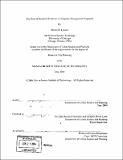| dc.contributor.advisor | David Laws. | en_US |
| dc.contributor.author | Lenard, Steven R. (Steven Robert), 1976- | en_US |
| dc.contributor.other | Massachusetts Institute of Technology. Dept. of Urban Studies and Planning. | en_US |
| dc.date.accessioned | 2005-06-02T18:17:23Z | |
| dc.date.available | 2005-06-02T18:17:23Z | |
| dc.date.copyright | 2004 | en_US |
| dc.date.issued | 2004 | en_US |
| dc.identifier.uri | http://hdl.handle.net/1721.1/17695 | |
| dc.description | Thesis (M.C.P.)--Massachusetts Institute of Technology, Dept. of Urban Studies and Planning, 2004. | en_US |
| dc.description | Includes bibliographical references (p. 96-99). | en_US |
| dc.description.abstract | This thesis investigates the effectiveness of the Glen Canyon Adaptive Management Program (GCDAMP) in improving and increasing the contributions of scientists to natural resource management decision-making. Natural resource managers turn to scientists for assistance in understanding the complex natural systems they are charged with managing. However, interaction between scientists and decision makers is traditionally been described in terms of tensions and tradeoffs, which lead to a less than optimal utilization of scientific information in policy decisions. The primary cause of these tensions is a mutual lack of understanding of the differences between the norms of practice within the scientific and policy communities, respectively. Adaptive management is a promising strategy to resolve these tensions. The GCDAMP is one of the most developed adaptive management programs in the country. This research compares the experience of GCDAMP scientists with that of scientists within the US Geological Survey (USGS). USGS is a research science organization within the Federal government, and as such is constantly facing the tension between science and policy. Their experience is used as a proxy for typical interactions between scientists and policy makers. The study found that GCDAMP scientists contributed more freely, to more aspects of decision- making, than scientists working with more traditional policy formulation processes. The main reason for this was the strong and secure role scientists play in the GCDAMP as compared to more tenuous and less consistent roles played by scientists in decision making processes in which USGS scientists participate. | en_US |
| dc.description.abstract | (cont.) The strong and secure role allowed for much more frequent and substantial collaborative interaction between scientists and decision makers. This interaction clarified to each group the norms of practice within the communities of the others and created negotiated space in which scientists could engage in activities useful to policy decision-making but which USGS scientists generally avoid. While the emphasis on scientific experimentation in management action characteristic of adaptive management was a major driver of improved collaborative interactions, the collaboration itself proved to be equally, if not more, important to improving the contribution of scientists to GCDAMP management decisions. | en_US |
| dc.description.statementofresponsibility | by Steven R. Lenard. | en_US |
| dc.format.extent | 99 p. | en_US |
| dc.format.extent | 5039147 bytes | |
| dc.format.extent | 5038954 bytes | |
| dc.format.mimetype | application/pdf | |
| dc.format.mimetype | application/pdf | |
| dc.language.iso | eng | en_US |
| dc.publisher | Massachusetts Institute of Technology | en_US |
| dc.rights | M.I.T. theses are protected by copyright. They may be viewed from this source for any purpose, but reproduction or distribution in any format is prohibited without written permission. See provided URL for inquiries about permission. | en_US |
| dc.rights.uri | http://dspace.mit.edu/handle/1721.1/7582 | |
| dc.subject | Urban Studies and Planning. | en_US |
| dc.title | The role of research scientists in adaptive management programs | en_US |
| dc.type | Thesis | en_US |
| dc.description.degree | M.C.P. | en_US |
| dc.contributor.department | Massachusetts Institute of Technology. Department of Urban Studies and Planning | |
| dc.identifier.oclc | 56403763 | en_US |
